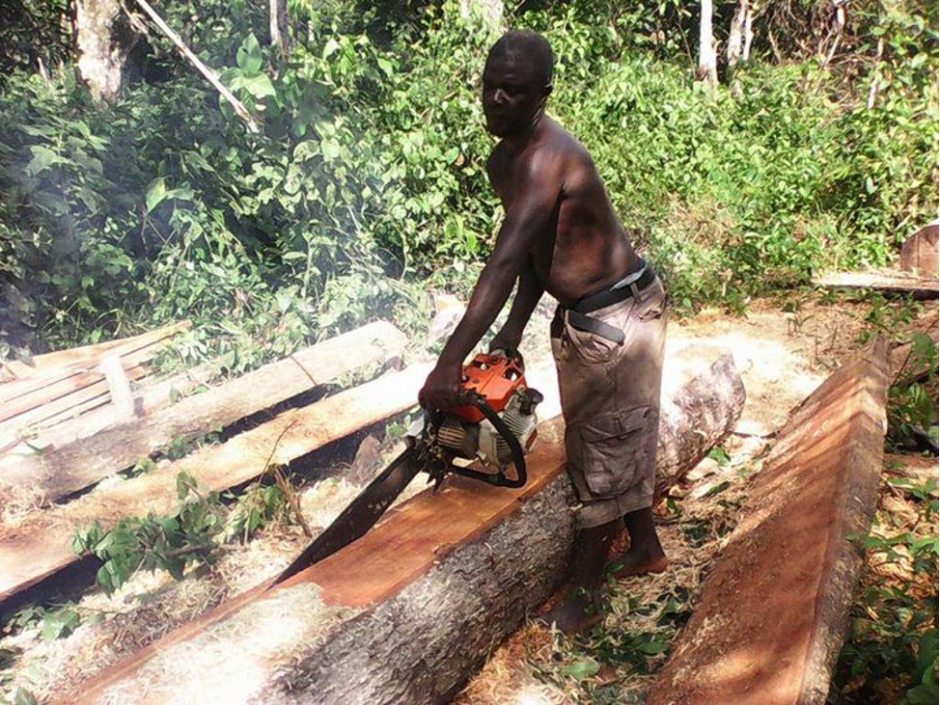
NEEZWEIN, River Cess — A power struggle is playing out here deep in the forest and the stakes for the local people are high. Logging companies with concession agreements that include thousands of dollars of benefits for local communities say their work is being hamstrung by informal loggers who disrupt their operations. Informal loggers say they have no other means of income and cannot abandon their activities. The situation has been complicated by local authorities which have awarded licenses to informal loggers on the same areas where the national government has awarded concessions.
A law that would integrate informal logging into the legal forestry framework has yet to be implemented. In the meantime disputes are erupting across the country.
River Cess Concessions Paralysed; Companies Blame Local Authorities:
Here in River Cess three logging companies operating forest management contracts say their concession areas are being occupied by informal loggers. The loggers are known as “chainsaw loggers” or “pit sawyers” because of the machines they use to cut up the trees.
The logging companies say the very trees they should have harvested are being illegally harvested by these informal loggers. E.J. and J Investment Corporation, one of the logging companies here, said it has ceased operations. Two others continue operations but all three have stopped paying the community development funds that were part of their agreements – scholarship funds, construction of pit latrines and pumps. The communities are facing numerous challenges ranging from lack of safe drinking water to bad road connectivity.
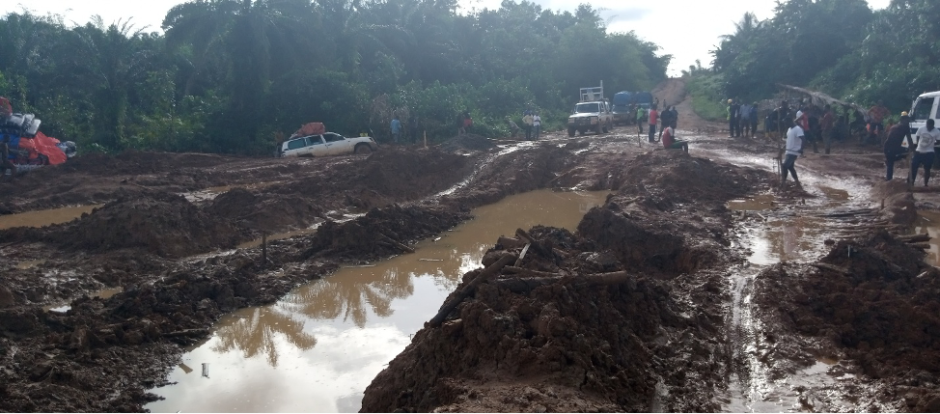
The companies blame the local authorities for giving licenses to informal loggers.
“The local authority has instructed the community people and they have made a massive farm into the concession and carrying on massive pit sawing as well,” said Stanley Wizard, General Coordinator at E.J. and J which is owned by Eliza D.J. Kroyahn. He said informal loggers had taken all the types of trees or “species” that was the basis of the concession. “We are not paying land rental or we don’t want to operate because we want to look at the forest, we needed the market species. So those species are all gone, so we find it very difficult to maintain that identical concession.”
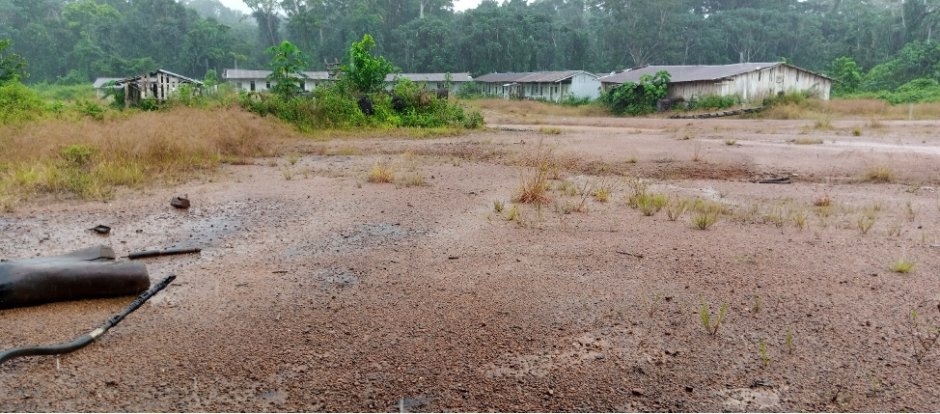
Leaders at the two other logging concessionaires – Cesare Colombo, CEO of African Wood and Lumber Liberia African and Risks Twe Sr. at Liberia Tree and Trading Corporation – backed Wizard’s claims.
In every concession area there is a governance structure known as the Community Forestry Development Committee or CFDC.
The CFDC represents communities whose livelihoods are affected by the operations of the logging companies as well as ensuring that these communities get the benefits they are owed in payment for their resources.
Matthew Walley, George Garjay and Sonnie Geequah, heads of the three respective CFDCs in River Cess, confirmed the companies’ claims. The CFDCs also blame the local county administration which they say collects fees from the chainsaw loggers.The committee collects the money on the county administration’s behalf. The rate is LD25.00 (US5.6 cents) from the informal millers on every piece of milled timber that leaves the county.
“It’s nothing to hide, that whole fifty-seven thousand two hundred and sixty something hectares that E.J. and J. got, it has been covered by pit sawyers,” Walley said. “When you go to the forest, the saws that are there are more than what E.J. and J. had when they were operating.”
In separate interviews, Elijah Kassaynee River Cess’ Fiscal Superintendent, and Isaac Williams, the County’s Information Officer, confirmed that money collected from chainsaw activities in the county does not go to national government revenue.
They say the money is used by the county administration on “county operations.” They were unable to show any official accounting for these funds. The two officials said there is no law that bans chainsaw milling in the country and as such, the county from which the resources are taken must benefit.
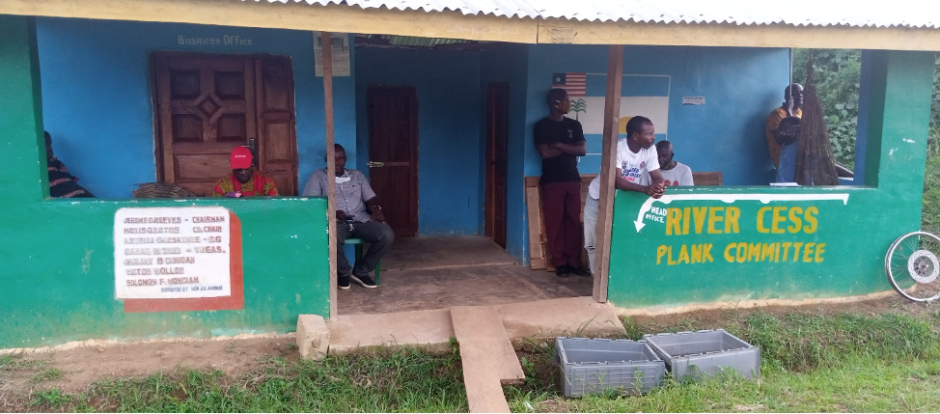
The community leaders are also profiting. A team of chainsaw loggers fell trees and mill them into planks on the spot. The planks are then carried on porters’ heads to the roadside for loading and transportation to Monrovia and other cities where they are used for furniture and construction.
Each team has one operator, at least two helpers and five wood carriers. Some members of the community are also hired as cooks and bush managers. The millers are headed by a boss who owns up to four saws. The head of the team usually pays the sum of $LD25, 000 as a registration fee for each saw to leaders of the community. Following registration, they move into the forest and build camps from where they carry out their operations.

Informal Logging Plagues Concessions in Other Counties:
This is not only happening in River Cess. In Nimba where Liberia Tree and Trading Cooperation operates a Community Forestry Management Agreement (CFMA), production manager Risks Twe Jr. said the company is also finding it difficult to get these chainsaw loggers from the concession area.
Twe Jr. said the heavy presence of chain saw loggers in the concession areas in both River Cess and Nimba is causing the company huge losses.
“Whenever the pit sawyers go within the forest, they cut down our rich ones that we are thinking on to get money from,” said Twe Jr.
In Lofa County, Yassa Morris the Chief Officer of the Salayea Community Forest, said pit sawyers are causing trouble to concessions in the community forest there.
“Pit sawing is going on in our forest,” he said. “That is why we are trying to connect all partners that can support us to carry out this awareness over and over.”
The National Forestry Reform Law of 2006 and the Community Rights Law of 2009 are the two laws that govern forestry activities in the country. Both are silent on informal loggingoperations.
A regulation named the Chain Sawing Regulation No 115-11 produced by the FDAestablishes a structured process by which authorization for informal logging is requested, reviewed, and granted or denied. It is on paper but has yet to be implemented.
TheLiberia Chainsaw and Timber Dealers Union, a group representing informal loggers, is working on integrating the regulationinto the forestry legal framework.
Julius Kamara, Union leader, said his membersdo not have any nationally accredited legal permit to operate in any forest, but he confirmed local county authorities are licensing chainsaw operators access to the forest.
He defends the arrangement saying the informal loggers are contributing to the economy of the country.
“It’s a livelihood for more Liberians that are jobless,” Kamara said. “After the civil war you find people that were carrying arms.They were disarmed and then there’s no other alternative, so they can only find themselves into chainsaw activities and now, people are making life.”
Emmanuel Quasee, coordinator of the Union in River Cess, agreed that chainsaw milling is the only source of income for him and his team of ten who have no other skills.
“Really, the chainsaw is the only way for us now we can survive by, because no company, no other job,” said Mr. Quasee, who has been in the business since 2004 and has a family of seven to support including four kids.
“Through the chainsaw there where we send our children school; our other old, old people we got we sustain them too, and there is no other means.”
Janjay Zodehgar, another informal logger who has five children, has done well from the business. He now runs a provision shop in Yarpah Town which he set up using proceeds from chainsaw milling. But he is not happy with the uncertainty of the current arrangement.
“To be very frank, the local authority and national government are not treating us fine,” Zodehgar said. “My appeal to the government, they should put us in the system that we can register. That means we only get tax to pay to government but not to pay all those petty money.”
Zodehgar has already paid a$LD100, 000 registration fees to community leaders for his four saws. He believes heis not doing anything illegal, because they pay fees to the community, the county government and the Forestry Development Authority (FDA).
The FDA, charged with regulating the sector, has never received any report of chainsaw activities in any concession area in Liberia, according to Chief Konikay A. Nimely, an FDA official. Nimely said in an interview that the FDA is currently in consultations with the stakeholders in the sector on how to integrate pit sawing into the forestry legal framework.
Jonathan Yiah the Manager of the forest governance program at the Sustainable Development Institute (SDI), a national civil society organization working on conservation and governance issues, said the forest sector is facing bigger problems.
“The concessionaires are saying chainsaw millers are damaging their concessions,” Yiah said. “But the reality is such forest has been over logged or depleted and chainsaw is just being used an excuse.”
According to Yiah, while the chainsaw regulation is not being implemented, the national government still collects taxes from those involved in the practice,“so technically it endorses the chainsaw operations.” Yiah warned that if the informal industry is not brought under the national forestry regime, chainsaw operations may cause such bad deforestation that the only use for the land will be mono-culture plantations like oil palm or rubber that are devastating to the environment and biodiversity.
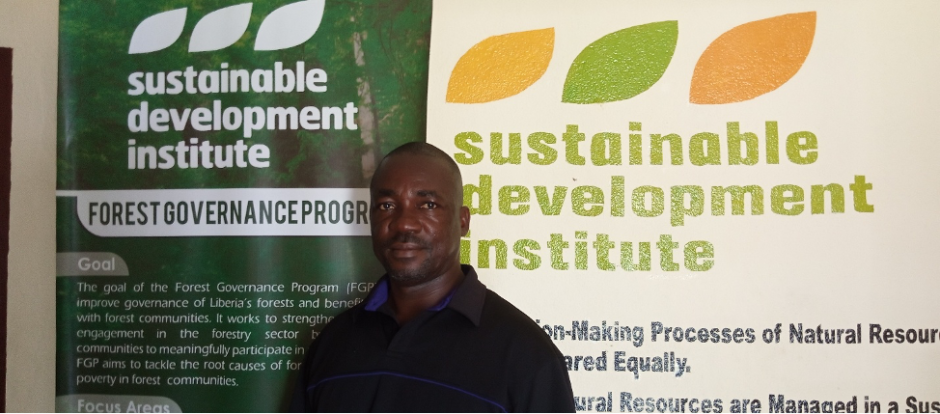
This story was a collaboration with New Narratives as part of its Land Rights and Climate Reporting project. Funding was provided by the UK Foreign and Commonwealth Development Office and the American Jewish World Service. The funders had no say in the story’s content.
